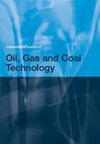<i>耳番泻</i>提取水基钻井泥浆的粘弹性、触变性和过滤性能
IF 0.7
4区 工程技术
Q4 ENERGY & FUELS
International Journal of Oil, Gas and Coal Technology
Pub Date : 2023-01-01
DOI:10.1504/ijogct.2023.129576
引用次数: 3
摘要
纳米材料增强水基泥浆(WBM)的局限性和挫折导致了环保型泥浆的出现。在本研究中,观察到在30°C、70°C和110°C条件下,耳塞纳增强水基泥浆(SWBM)的流变性能有较好的增强。采用不同浓度,即0.5 wt. %、1.0 wt. %和1.5 wt. %的木耳塞舌尔,研究其对WBM流变学和过滤性能的影响。对WBM和SWBM进行了热稳定性和老化研究。然后用流变模型对实验结果进行建模。结果表明,木耳番泻改善了钻井泥浆的热稳定性和流变性能,显著降低了美国石油协会(API)的滤液。NFWDF项目的流变性能数据更符合Herschel-Bulkley模型,表明其流变性能和过滤性能有所改善。本研究为开发新型环保、可生物降解、可回收、经济高效的WBM添加剂以改善其流变性能奠定了重要的基础。该研究还有望通过解决深井钻井和高温高压钻井中的主要问题来帮助该行业。[收稿日期:2022年5月10日;录用日期:2022年9月17日]本文章由计算机程序翻译,如有差异,请以英文原文为准。
Effects of <i>Senna auriculata</i> extract on viscoelastic, thixotropic and filtration properties of water-based drilling mud
The limitations and setbacks observed in the nanomaterials enhanced water-based mud (WBM), led to the emergence of eco-friendly mud. In this study, a better enhancement in the rheological properties of Senna auriculata enhanced water-based mud (SWBM) at 30°C, 70°C and 110°C is observed. Different concentrations, viz., 0.5 wt. %, 1.0 wt. % and 1.5 wt. % of Senna auriculata are used to study its effects on the rheological and filtration properties of WBM. Thermal stability and aging studies are performed for both WBM and SWBM. The experimental results are then modelled using rheological models. The results reveal that Senna auriculata improve the thermal stability and rheological properties of drilling mud and significantly decrease the American Petroleum Institute (API) filtrate. The rheological performance data of NFWDF project a better fit with the Herschel-Bulkley model and suggest improvement in rheological and filtration properties. This study serves as an important prelude for the development of new environmentally friendly, biodegradable, recyclable and cost-effective additives for WBM to improve its rheological properties. This research is also expected to aid the industry by resolving major issues in deep well drilling and HPHT drilling. [Received: May 10, 2022; Accepted: September 17, 2022]
求助全文
通过发布文献求助,成功后即可免费获取论文全文。
去求助
来源期刊

International Journal of Oil, Gas and Coal Technology
ENERGY & FUELS-ENGINEERING, CHEMICAL
CiteScore
1.30
自引率
0.00%
发文量
86
审稿时长
2.9 months
期刊介绍:
IJOGCT is a multidisciplinary refereed journal that is concerned with exploration, production, processing and refining, storage and transportation, economical, managerial, business, environmental, safety and security issues related to oil, natural gas, coal and petrochemicals as well as manufacturing and refining of biofuels.
Topics covered include
Exploration, geological studies, reserves estimation
Production/recovery methods, drilling technology, subsea engineering
Production rates, forecasting future demand
Heavy oil, oil sand/shale recovery/processing, oil/gas field processing
Petroleum refining, coal liquid/hydrogen production, petrochemical industry
Ultra low sulphur fuels, LNG, CNG and LPG, natural gas processing
Gasoline from natural gas/coal liquid, biorefining, biofuels
Nano/biotechnology, computerisation/automation, modelling/simulation
Refinery process optimisation, management of refining industry, major oil companies
Fuel quality/specifications, storage, transportation
Environmental issues, carbon management, sequestration, storage
Oil spill occurrence, monitoring, clean up methods, contingency plans
Fuel prices, future market fluctuations, forecasting, safety/security
Business/international trade regulations, political/governmental/economic issues
Biofuels vs fossil fuels; future technology, business.
 求助内容:
求助内容: 应助结果提醒方式:
应助结果提醒方式:


